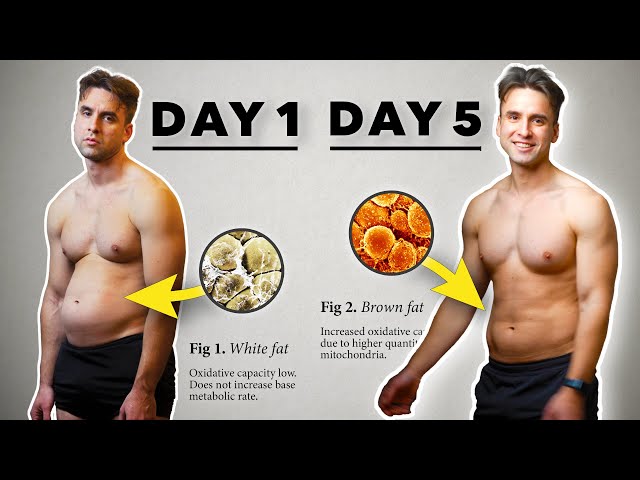Revitalize Your Health: Exploring the Profound Benefits of a 5-Day Fast
In the hustle and bustle of modern life, our bodies are often subjected to constant stressors. Intermittent fasting has emerged as a transformative practice, and within this realm, the 5-day fast has garnered attention for its potential to revitalize health. This article delves into the incredible benefits of undertaking a 5-day fast, exploring its impact on metabolism, cellular health, and cognitive function.

Health Advantages of a 5-Day Fast
Metabolic Reset and Weight Management
Embarking on a 5-day fast initiates a profound metabolic reset. The extended fasting period encourages the body to shift from using glucose as its primary energy source to burning stored fat. This metabolic shift not only aids in sustainable weight loss but also enhances overall metabolic function. As the body adapts to utilizing fat for energy, individuals often experience a more efficient metabolism, supporting long-term weight management goals.
Cellular Repair and Regeneration
Beyond weight management, a 5-day fast activates a process known as autophagy, a cellular cleaning mechanism. During this period, the body identifies and removes damaged or dysfunctional cells, promoting cellular regeneration. This natural process contributes not only to cellular health but also to the overall well-being of various bodily systems.
Mental Clarity and Cognitive Enhancement
Fasting for five days has been linked to improved mental clarity and cognitive function. As the body enters a state of ketosis, where it relies on ketones for energy, the brain experiences enhanced focus and clarity. Additionally, fasting supports the production of brain-derived neurotrophic factor (BDNF), a protein associated with cognitive function and mental resilience.
Scientific Insights
Hormonal Changes and Their Impact
Understanding the science behind a 5-day fast reveals significant hormonal adjustments that contribute to its benefits. Growth hormone levels surge during fasting, promoting fat metabolism and muscle preservation. Simultaneously, cortisol, the stress hormone, decreases, creating a more balanced physiological state. These hormonal shifts play a pivotal role in the metabolic and cellular benefits observed during extended fasting.
Inflammation Reduction
Chronic inflammation is a precursor to various health issues. The 5-day fast has been associated with a reduction in inflammation markers. This anti-inflammatory effect extends to multiple organ systems, potentially providing relief for conditions influenced by excessive inflammation. Exploring the connection between fasting and inflammation underscores the comprehensive impact of this practice on overall health.
Real-Life Experiences
Success Stories
Real-life experiences serve as powerful testimonials to the effectiveness of a 5-day fast. Individuals from diverse backgrounds share stories of increased energy levels, mental clarity, and a profound sense of well-being. These success stories not only inspire but also provide insights into the diverse positive outcomes achievable through disciplined fasting.
Challenges and Solutions
While the benefits of a 5-day fast are substantial, it’s essential to address common challenges. Hunger, fatigue, and mental hurdles may arise during the fasting period. This section provides practical tips and solutions, empowering individuals to navigate these challenges successfully and maximize the benefits of a 5-day fast.
Precautions and Considerations
Consultation with Healthcare Professionals
Before embarking on a 5-day fast, it’s crucial to consult with healthcare professionals, especially if you have underlying health conditions. While fasting can offer numerous benefits, individual health circumstances may vary, and professional guidance ensures a safe and tailored approach to extended fasting. This precaution is particularly important for individuals with diabetes, cardiovascular issues, or those on specific medications.
Individual Variations
Acknowledging that individuals may respond differently to a 5-day fast is fundamental. Factors such as age, overall health, and lifestyle play a role in how the body adapts to extended fasting. This section explores the importance of listening to one’s body, understanding personal limitations, and adjusting the fasting approach accordingly.
Integrating Fasting into Lifestyle
Intermittent Fasting Techniques
For those new to extended fasting, incorporating intermittent fasting techniques serves as a gradual introduction. Starting with shorter fasting windows and gradually progressing to a 5-day fast allows the body to adapt. This section provides insights into various intermittent fasting schedules, helping individuals find an approach that aligns with their preferences and lifestyles.
Balanced Nutrition Post-Fast
Completing a 5-day fast is just the beginning. This section guides individuals on transitioning back to regular eating in a health-conscious manner. Emphasizing the importance of balanced nutrition post-fast ensures that the benefits accrued during the fasting period are maintained, contributing to long-term health and well-being.
Frequently Asked Questions (FAQs) About the Benefits of a 5-Day Fast
1. Q: Is a 5-day fast safe for everyone?
While generally safe for many, it’s advisable to consult healthcare professionals, especially for those with underlying health conditions.
2. Q: Can I drink water during a 5-day fast?
Yes, staying hydrated is crucial. Water, herbal tea, and black coffee are generally acceptable during the fasting period.
3. Q: Will I lose muscle mass during a 5-day fast?
The body prioritizes fat for energy during fasting, preserving muscle mass. Incorporating light exercises can also help.
4. Q: How often can I do a 5-day fast?
Frequency depends on individual tolerance and health considerations. Consulting healthcare professionals before each extended fast is recommended.
5. Q: What should I eat after a 5-day fast?
Start with easily digestible foods like broth, fruits, and vegetables. Gradually reintroduce regular meals to avoid digestive discomfort.
6. Q: Can I continue my regular activities during a 5-day fast?
Light activities are generally acceptable. However, listen to your body, and if in doubt, consult with healthcare professionals.
7. Q: Will I experience mental fatigue during an extended fast?
While some individuals may experience mental fatigue, many report heightened mental clarity during and after the fasting period.
8. Q: Are there age restrictions for a 5-day fast?
Generally, age is not a strict restriction, but individual health conditions and consultation with healthcare professionals become more critical, especially for older individuals.
9. Q: Can I take supplements during a 5-day fast?
It’s advisable to consult with healthcare professionals before taking supplements during fasting, as individual needs vary.
10. Q: What are common misconceptions about 5-day fasting?
Common misconceptions include concerns about muscle loss, extreme hunger, and the idea that fasting is only for weight loss. Understanding the science behind fasting can dispel these myths.
Conclusion:
In conclusion, the benefits of a 5-day fast extend beyond mere physical changes; they encompass a holistic transformation of mind and body. From metabolic reset to enhanced mental clarity, the journey involves understanding the science, learning from real-life experiences, and approaching fasting with caution and consideration.









